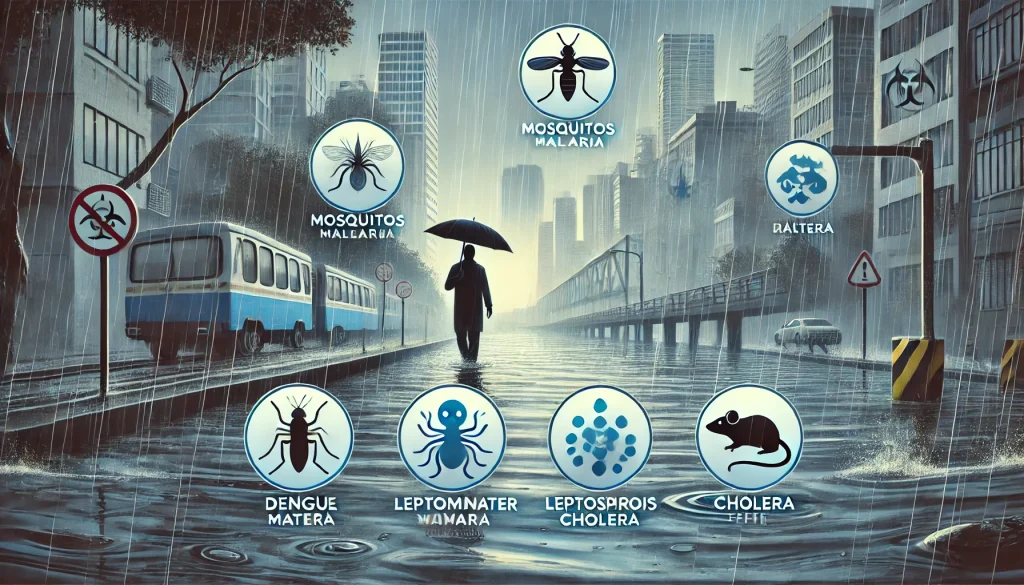5 Dangerous Diseases That Come with Rain: Causes, Symptoms, and Prevention

Rain can be refreshing, rejuvenating, and essential for the environment. However, with the arrival of the rainy season, there is often an uptick in certain diseases. These diseases thrive in the moist conditions and can affect both rural and urban populations alike. In this article, we will explore five dangerous diseases that are commonly associated with rain, focusing on their causes, symptoms, and preventive measures. Understanding these diseases can help you protect yourself and your loved ones.
Table of Contents
1. Leptospirosis
Causes:
Leptospirosis is a bacterial disease caused by the Leptospira bacteria, which is commonly found in the urine of infected animals, particularly rodents. During the rainy season, waterlogged areas can become contaminated with this bacteria, posing a serious risk to those who come into contact with it. Leptospirosis spreads through cuts or abrasions on the skin or mucous membranes, especially when people wade through floodwaters.
Symptoms:
Leptospirosis symptoms can vary, ranging from mild to severe. The early signs of leptospirosis often resemble flu-like symptoms, including:
- Fever
- Headache
- Muscle pain
- Chills
- Vomiting
In severe cases, leptospirosis can lead to organ damage, meningitis, respiratory distress, or even death. This severe form of leptospirosis is known as Weil’s disease, which affects the liver and kidneys, potentially leading to life-threatening complications.
Prevention:
- Avoid wading through floodwaters.
- Wear protective clothing, such as boots and gloves, if contact with contaminated water is necessary.
- Keep the surrounding areas free from rodent infestations by maintaining proper sanitation and using traps or repellents.
2. Dengue Fever
Causes:
Dengue fever is a mosquito-borne viral infection caused by the Aedes mosquito, which thrives in stagnant water. The rainy season creates a perfect breeding ground for mosquitoes, increasing the risk of dengue outbreaks. Dengue is primarily transmitted when an infected mosquito bites a human, injecting the virus into the bloodstream.
Symptoms:
Dengue fever presents with a wide range of symptoms, including:
- High fever
- Severe headache
- Pain behind the eyes
- Joint and muscle pain
- Skin rashes
- Mild bleeding (such as nosebleeds or gum bleeding)
A severe form of dengue, known as dengue hemorrhagic fever, can lead to internal bleeding, shock, and organ failure, which may be fatal if not treated promptly.
Prevention:
- Eliminate stagnant water from flower pots, tires, and other containers where mosquitoes can breed.
- Use mosquito nets and insect repellents, especially in high-risk areas.
- Wear long-sleeved shirts and long pants to minimize skin exposure.
- Install window and door screens to keep mosquitoes out.
3. Malaria
Causes:
Malaria is another mosquito-borne disease, but it is caused by the Plasmodium parasite, which is transmitted through the bite of the Anopheles mosquito. Malaria is more common in tropical and subtropical regions, but the rainy season increases mosquito activity and enhances the chances of infection. Flooded areas and pools of stagnant water provide ideal breeding habitats for these mosquitoes.
Symptoms:
Symptoms of malaria usually develop within 7 to 30 days after being bitten by an infected mosquito. They include:
- High fever
- Chills
- Sweating
- Fatigue
- Nausea and vomiting
- Headache
In severe cases, malaria can cause anemia, respiratory distress, organ failure, and death. It is particularly dangerous for pregnant women, children, and individuals with weakened immune systems.
Prevention:
- Sleep under insecticide-treated mosquito nets.
- Take antimalarial medication if you live in or travel to areas where malaria is endemic.
- Apply mosquito repellent to exposed skin and clothing.
- Eliminate stagnant water around your home and surroundings.
4. Cholera
Causes:
Cholera is a waterborne disease caused by the Vibrio cholerae bacteria, which typically spreads through contaminated food and water. During the rainy season, flooding can contaminate water supplies, making cholera outbreaks more likely. Poor sanitation and lack of access to clean drinking water contribute significantly to the spread of cholera.
Symptoms:
The hallmark of cholera is severe diarrhea, which can lead to dehydration and electrolyte imbalance. Other symptoms include:
- Vomiting
- Rapid heart rate
- Muscle cramps
- Low blood pressure
- Thirst
- Sunken eyes
In severe cases, cholera can result in shock, organ failure, and death if not treated promptly. Cholera progresses rapidly, so immediate medical intervention is critical.
Prevention:
- Drink only safe, treated, or boiled water.
- Wash your hands frequently with soap and clean water, especially after using the toilet and before handling food.
- Avoid eating raw or undercooked seafood, as they can be contaminated with cholera bacteria.
- Maintain proper sanitation and dispose of human waste appropriately.
5. Typhoid Fever
Causes:
Typhoid fever is a bacterial infection caused by Salmonella typhi, which spreads through contaminated food and water. During the rainy season, floods and improper waste disposal can cause the contamination of drinking water with sewage, leading to the spread of typhoid fever.
Symptoms:
Typhoid fever typically presents with:
- Prolonged high fever
- Weakness
- Stomach pain
- Loss of appetite
- Headache
- Diarrhea or constipation
In severe cases, typhoid can cause intestinal perforation or bleeding, which can be life-threatening if not treated.
Prevention:
- Ensure access to clean and safe drinking water by using water purification methods, such as boiling or chlorination.
- Practice good hand hygiene, especially after using the toilet and before eating.
- Get vaccinated against typhoid fever if you live in or travel to high-risk areas.
- Avoid consuming street food and ensure that food is properly cooked and stored.
General Rainy Season Health Tips
Beyond these five dangerous diseases, it’s essential to maintain overall health and hygiene during the rainy season. Here are a few general tips to protect yourself:
- Keep Surroundings Clean:
Clean your surroundings regularly to prevent the accumulation of water, which is a breeding ground for mosquitoes and bacteria. - Stay Hydrated:
Ensure that the water you drink is clean and safe. Using water purifiers or boiling water is essential during the rainy season to avoid waterborne diseases. - Personal Hygiene:
Regularly wash your hands with soap and water, especially before meals and after visiting the toilet. This helps prevent the spread of infections. - Eat a Balanced Diet:
A nutritious diet strengthens your immune system, which can help your body fight off infections. Ensure that your food is cooked thoroughly to kill any harmful bacteria. - Wear Protective Gear:
When venturing into areas with stagnant water or flooding, wear boots and raincoats to minimize your exposure to contaminated water. - Dispose of Waste Properly:
Ensure that garbage is disposed of correctly and that drains are not clogged. This prevents waterlogging and reduces the risk of bacterial and mosquito breeding.
Conclusion
The rainy season brings much-needed water for the environment, but it also increases the risk of diseases such as leptospirosis, dengue fever, malaria, cholera, and typhoid fever. These diseases thrive in wet and contaminated environments, making it vital to take preventive measures during this time. By staying informed and taking proactive steps like maintaining good hygiene, eliminating stagnant water, and ensuring access to clean drinking water, you can significantly reduce the risk of contracting these dangerous diseases. Stay safe, stay healthy, and enjoy the rainy season responsibly.


